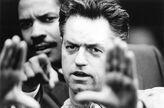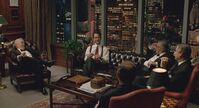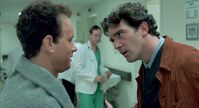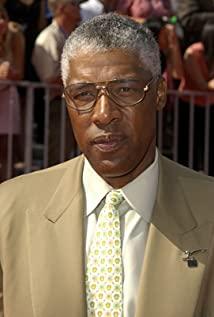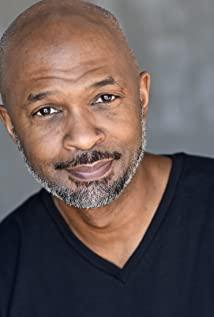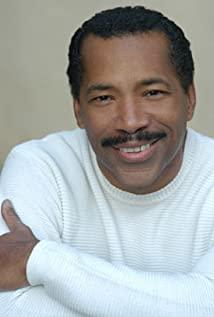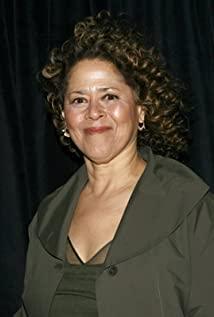"Philadelphia Story" was born in the early 1990s, with Philadelphia as the place where the Declaration of Independence was issued. The background, to put it simply, is a gay lawyer suffering from AIDS. In order to defend his rights, he found another lawyer to help him file a lawsuit. He finally won the lawsuit, but he still died in
the 1990s. gay topic is just emerging, "the Philadelphia story" can be considered the film's first to face this serious subject, under the appearance of dismissal lawsuit, wrapped in the world of discrimination against people with AIDS, discrimination against homosexuals
in fact lawsuit start from, just from the victory From a negative perspective, Andrew, played by Tom Hanks, has a certainty of victory. Both sides of the debate have always been entangled in whether Andrew has the ability to work or is slack in his duties, just as the jury finally said: I don't believe that the company will. The key to handing such an important case to a person who has no ability to work
is actually to see how the director choreographs such a story.
Jonathan Demme's influence style has a great feature, which is the skillful use of close-up shots. In The Lamb, Jonathan uses close-up shots to perfection. Jodie Foster is in the dark room, a scene of confrontation with criminals. From the criminal's first-person perspective and night vision Judy's close-up, the heroine's terrified, helpless but at the same time. The image of hidden courage is displayed in front of the audience, becoming a classic case
in film history. In "Fei", Jonathan made this technique to the extreme.
It is said that Tom Hanks lost 30 pounds in order to show the morbid image of an AIDS patient (including in "The Rest of the Desert Island", Tom Hanks also increased and dropped sharply, his dedication is evident, two consecutive Oscar winners, Worthy of admiration), at the beginning of the film, Tom Hanks and Denzel Washington's opposite play, the director will fight back and forth in the close-up, introducing a healthy and confident Andrew to the audience; then slowly expose the fact that Andrew has AIDS, gradually The thin and pale face revealed to the audience a morbid image; during the high-level office, in the design of the scene, the camera slowly moved from the medium shot to the close-up, highlighting the philistine and cunning of the high-level executives. Praise in every possible way, in contrast to when Andrew was fired at the back, the two sides at the long table were opposed, and the close-up of Andrew’s astonished panorama changed to contrast; the confrontation in court, the camera was panned twice, and the close-up group portraits of the high-level and defense lawyers were only contrasted with the single shadow of the prosecution; Dan Ze Miller, starring Washington, has become the only more active character in the film. The close-up shots are only shown in large quantities during the preparations in court after the party. In addition to sympathy, there are also concepts that are poured into Miller. Variety.
During the discussion after the masquerade party, Andrew stood up slowly holding the bottle, the camera gradually raised, and the overhead shot was used to aim at Andrew. The use of the overhead shot compresses Andrew's image, and the pressure of the world adds to the physical stress. The pain made it more fragile and breathless; the camera reversed, slowly pushing Miller's close-up, Miller went from repeatedly emphasizing the questioning and discussion in court to gradually becoming quiet and observing Andrew; Andrew held the hanging bottle, and the overhead camera began to shake slowly, With the change of the symphony, the natural light effect becomes darker, leaving only a silhouette of Andrew; then the red background light comes on, with the symphony setting off the blood and killing, Andrew's pale face is illuminated by the red light, and depression and grief roll in with the music. The flames danced, forming a mottled and uneven yellow color on his face. Is it the music that brought depression and chill, or the irresistible fate and the incomprehensible of the world because of his pain and inability to extricate himself; Andrew and Miller were not the only ones who burst into tears. , and the audience. I can also experience the beauty, the appeal of art, self-confidence, maturity, and masculine charm, but because of sexual orientation, illness, and worldliness, I have become a complete victim of the
film. With the mask, in addition to the delivery of oxygen, there is also an enlightened mind and warm current for the dying souls
We often think about and discuss the power of human beings. When this power goes against the world, there are always disputes and compromises; China has also recorded records of split peach and broken sleeves since ancient times. In addition to banning the film and then showing and discussing it, it has always been a closed topic.
In the film, when Andrew and Miller walked out of the court, they were faced with the scolding and curses of the world, just like Miller's defense in the film: what do you care about? AIDS and homosexuality. Jonathan wraps these two topics on each other and pushes them to the world for discussion. In addition to triggering thinking, there is also a wake-up call: the values we insist on and stick to are sometimes a disguised murder of
me is love.
This is a passage from the opera quoted in this film. Lines: The sadness added to me can't dissolve me and
Aichen laughing 12/10/26
View more about Philadelphia reviews




